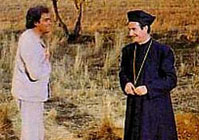|
|
|
|
Dark
at Noon
|
 |
|
During the 1993 Australian Film Institute retrospective of his work, Chilean born director Raúl Ruiz – one of the finest and most bewitching of contemporary filmmakers – was asked to describe his uniquely surrealistic approach to filmmaking. He responded with an anecdote about the Latin American writer Lezama Lima, who stated that the task of the poet is "to go into a dark room and build a waterfall there". Ruiz's films are full of such strange and intoxicating juxtapositions. And they create an equally idiosyncratic approach to screen narrative. Every story, he once suggested, exists in two, parallel universes. There is the normal universe in which characters act and react, using their free will (or so they believe) to shape their destiny. Then there is an invisible, occult universe, where immaterial beings stage-manage the predestined order of all things. But, as is obsessively the case in Ruiz's work, even this type of interpretation is really only the alibi for allegory, and hence another level of reading. The two worlds of the story – the real world and its double – correspond to a modern condition that Dark at Noon only alludes to through its dramatisation the "old fashioned" media of books, paintings, and the like, as almost living entities. The shadow world of the fiction is really our own, present-day realm of media representations: film, television, advertising billboards, computers. It is this which threatens to swallow us up on a daily basis. Dark at Noon is about such mind-spinning possibilities. It is also a comedy, a surreal game pieced together from bits of numerous philosophical systems, old horror movies and stories by Jorge Luis Borges and H. P. Lovecraft. Ruiz – an international hero of the cultural underground for over two decades – is a much copied artist. His lesser, and inexplicably better known, imitators include Peter Greenaway and Lars von Trier (Zentropa [1991]). But this is the first film in his twenty five year career to find theatrical and video release in Australia; one hopes it will win him the audience he deserves. Although many of Ruiz's films are frankly bewildering in their hallucinatory plot moves and proliferation of imaginary worlds, Dark at Noon unfolds relatively simply. Felicien (played by French comedian Didier Bourdon) travels to a remote Portuguese village, and finds his hard-won rationalism sorely tested by a dizzying, daily procession of miracles, apparitions and supernatural enigmas. Miracles, as Ruiz has remarked, are like cosmic jokes – but jokes, he always adds, are finally rather serious, and certainly more than a bit mysterious. Most mysterious in these proceedings is the relationship between a young married couple and a forbidding father figure – especially since both men in this triangle are incarnated by the same actor, John Hurt. Proceedings quickly spin into realms of madness, perversity and apocalypse that are both hilarious and disquieting. Characters swap identities, the letters of written words scramble on the page, parallel universes start communicating with each other, and the dead never seem to lie in their graves for very long. The barrage of dreamy visual effects which are the director's signature, and the atmospheric music by Jorge Arriagada, keep the viewer enchanted and intrigued even as the deep themes of the story remain cryptic. With Dark at Noon, Ruiz indeed managed to build a waterfall in a dark room. In many respects it is vintage Ruiz, but for the first time in the '90s the director had the resources to render his characteristic motifs in a lush, expansive manner. The film – although it did not manage to be for Ruiz the breakthrough into commercial mainstream success which his fans hoped it would be at the time – is an ideal introduction to the work of cinema's cheekiest and most gnomic poet. MORE Ruiz: Shattered Image, That Day, Three Lives and Only One Death, Time Regained, Three Crowns of the Sailor, The Tango of the Widower and Its Distorting Mirror, Of Great Events and Ordinary People, Mysteries of Lisbon, La noche de enfrente © Adrian Martin February 1993, May 1994 & January 2004 |
![]()